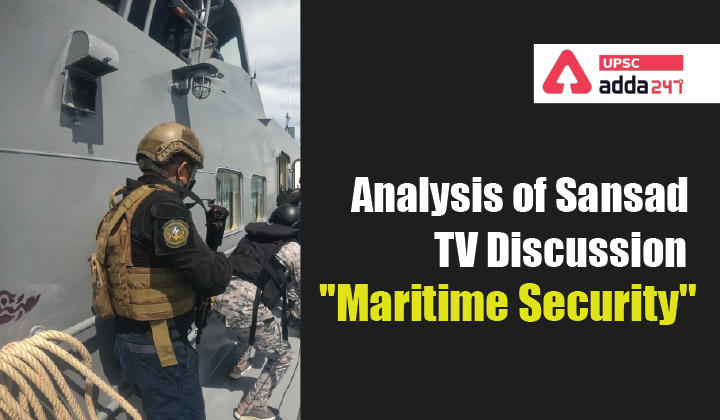Table of Contents
Context
The 5th East Asia Summit Conference on Maritime Security Cooperation was held in Kolkata on 23rd and 24th November 2021
What is Maritime Security?
- Maritime security involves protecting the nation’s sovereignty from threats arising from the oceans and seas.
- It includes protecting coastal areas, safeguarding the available ocean resources such as fish, offshore oil and gas wells, port facilities, etc.
- It also means maintaining freedom at sea for the movement of our ships and facilitating and protecting trade.
- Following are the elements of maritime security:
- International and national peace and security
- Protection of sea lanes of communication
- Sovereignty, territorial integrity and political independence
- Protection from crime at sea
- Access and security to the resources at sea
- Security of seafarers and fishermen
- Environmental protection
Importance of Maritime Security for India
- With a coastline of over 7000 KM, Maritime security is an important aspect of national security for India.
- Eighty per cent of global trade today is via the sea and the Indian Ocean is among the most important shipping routes in the world.
- Notwithstanding the primacy of sea lanes, there is no global consensus yet on what constitutes maritime security.
India’s Initiatives for Coastal Security
- The Government of India is implementing Coastal Security Scheme, in phases, to strengthen the security of coastal areas against seaborne threats.
- The Coastal Security Scheme aims to augment the capabilities of the police force of coastal states and UTs for patrolling and surveillance in territorial waters especially shallow waters close to the coast.
- India also has growing strategic interest due to its strong economic and political relations with Southeast Asian countries coupled with concerns about the safety of the sea lanes.
- At the 2018 Shangri-La Dialogue Prime Minister Narendra Modi outlined the vision for a free, open, inclusive and rules-based Indo-Pacific region which was universally welcomed.
- At the 14th East Asia Summit (EAS) in 2019, Prime Minister Modi announced the Indo-Pacific Oceans Initiative or IPOI as the practical implementation of this shared vision for the Indo-Pacific with a focus on collaborative effort to better manage, conserve, sustain and secure this maritime domain.
- In August this year under India’s presidency, United Nations Security Council also hosted a high-level open debate on enhancing Maritime Security. The 5 principles given by India Are:
-
- (a) to have a Safe, Secure and Stable maritime domain and remove barriers from legitimate maritime trade and respect the rights of each other’s sailors.
- (b) to settle maritime disputes in a peaceful manner and on the basis of international law only.
- (c) to face natural disasters and maritime threats created by Non-state actors together.
- (d) to preserve the maritime environment and maritime resources as oceans have a direct impact on climate.
- (e) to establish responsible maritime connectivity based on the physical sustainability and absorption capacity of the countries.
About UNCLOS
- The United Nations Convention on the Law of the Sea (UNCLOS) is an international treaty that was adopted and signed in 1982.
- It replaced the four Geneva Conventions of April 1958, which respectively concerned the territorial sea and the contiguous zone, the continental shelf, the high seas, fishing and conservation of living resources on the high seas.
- The Convention has created three new institutions on the international scene :
- the International Tribunal for the Law of the Sea,
- the International Seabed Authority,
- the Commission on the Limits of the Continental Shelf.
What is SAGAR Doctrine?
- It is an acronym for ‘Security and Growth for all in the Indian Ocean Region.’
- This vision focuses on cooperative measures for sustainable use of the oceans and provides a framework for a safe, secure, and stable maritime domain in the Indian Ocean region.
- These, together with India’s commitment to UNCLOS and customary law of the seas, provide a direction and a framework for efforts to enhance public good in the broader Indo-Pacific.
The East Asia Summit (EAS)
- It is a premier Leaders-led forum to exchange views on strategic issues in the Indo-Pacific.
- Since its inception in 2005, EAS has been playing an important role in addressing both traditional and non-traditional security challenges in the region, including in the maritime domain of the Indo-Pacific.
- The recently held 16th EAS Summit also touched upon these issues.
History of EAS Conference on Maritime Security
- It was initiated in 2015 with the first conference in New Delhi.
- The second was held in Goa in 2017, the third in Bhubaneswar in 2018 and the fourth in Chennai last year.
What Happened in the 5th EAS Conference on Maritime Security
- During the conference, experts from both government and academia from the EAS participating countries deliberated upon various aspects of maritime security cooperation under four thematic sessions, namely Maritime Security; Resource and Information Sharing; Science and Technology Cooperation; and Pandemic and Disaster Risk Reduction and Management.
- The event concluded with a panel discussion on the Way Forward.


 TSPSC Group 1 Question Paper 2024, Downl...
TSPSC Group 1 Question Paper 2024, Downl...
 TSPSC Group 1 Answer key 2024 Out, Downl...
TSPSC Group 1 Answer key 2024 Out, Downl...
 Cabinet Ministers of India 2024, New Cab...
Cabinet Ministers of India 2024, New Cab...







